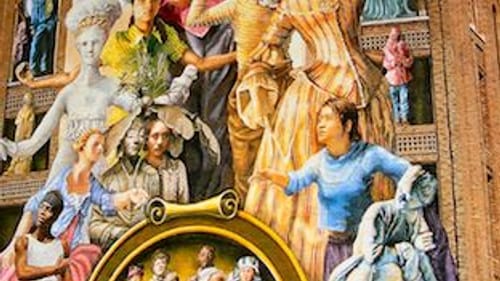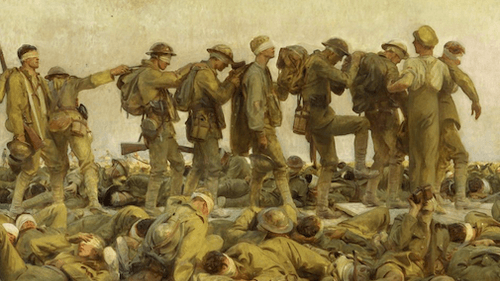Stay in the Loop
BSR publishes on a weekly schedule, with an email newsletter every Wednesday and Thursday morning. There’s no paywall, and subscribing is always free.
On bankrolling "frivolities"
Fighting federal funding foolishness

Eliminating federal arts funding isn’t even officially before Congress yet, but Philly arts advocates aren’t wasting any time. At a packed April 6, 2017, briefing at the Pennsylvania Academy of the Fine Arts, co-sponsored by the Greater Philadelphia Cultural Alliance (GPCA), Philadelphia Museum of Art director and CEO Timothy Rub said it’s time to “speak thoughtfully and loudly” on behalf of arts institutions. Rub was just one of many speakers there to support preserving federal arts dollars.
It remains to be seen whether our current president’s weird yen to axe the National Endowment for the Arts (NEA), the National Endowment for the Humanities (NEH), the Institute of Museum and Library Services, and the Corporation for Public Broadcasting will lead to actual cuts. But since news of his proposed budget broke, GPCA president Maud Lyon said at the event, “the Cultural Alliance has whipped into action.”
Good reasons to stop supporting art
The Heritage Foundation is salivating over the proposed budget, calling it “new insights” on a resurrected report titled “Ten Good Reasons to Eliminate Funding for the National Endowment for the Arts.” Released 20 years ago, the report asserts that “there is no need for the federal government to be spending your money on these programs.”
Besides succumbing to the “radical virus of multiculturalism,” the NEA is guilty of funding art depicting various types of sex, all of which affront the values of ordinary Americans. “Ten Good Reasons” accuses the NEA of bureaucratic inefficiency (a startling first for a government agency) and bankrolling “frivolities.” This diverts resources from real “creative activities,” luring artists to apply for federal grants instead of producing art,; therefore, artists are “even attending demonstrations in Washington, D.C.”
The study dismisses evidence that the arts can help prevent crime, and ominously notes that “the arts offer no cure for alcoholism either,” according to one work citing a high incidence of alcohol abuse among American writers. (Going forward, curing alcoholism should be the new benchmark for funding federal agencies.)

“NEA funding also threatens the independence of art and of artists,” the study says, quoting a McGill University professor who claims that culture sponsored by bureaucracy is no culture at all: “It was the unsubsidized writers, painters and musicians — imprisoned in their homes if they were lucky, in asylums or in gulags if they weren’t — who created lasting culture.”
Affording the least and losing the most
Somehow, PAFA’s speakers rose to the top of their fields without the heartening independence conferred by house arrest, asylums, and gulags.
“Those who can afford to lose the least are going to lose the most,” warned Art-Reach executive director John Orr, who, along with speakers like Taller Puertorriqueño executive director Carmen Febo San Miguel, noted that a large percentage of NEA and NEH funding targets low-income areas which would not otherwise have access to arts and culture programming.
Speaker after speaker pointed out the economic impact of the arts and culture sector, from tax revenues to jobs generated to percentage of US gross domestic product (4 percent, according to Karin Copeland of the Chamber of Commerce for Greater Philadelphia).
Cheering politicians
Politicians carried the message too: City Council members Kenyatta Johnson and Al Taubenberger, as well as State Senator Vincent Hughes.
Senator Hughes said “our humanity” is at stake with arts support “until we can turn this back.” He urged listeners not to “fall for the foolishness” in Washington.
Johnson led a raucous “save the arts” chant, but Taubenberger may have garnered the biggest cheers of all by dint of being a Republican who supports federal arts funding.

“Karin [Copeland] just put it in perspective with the numbers,” he said, adding that revenues from Philly’s arts and culture sector outpace dollars from the sports stadiums. Personally, given the choice between a Phillies game and an art museum, he said, he’d choose the Phillies, but “I’m with you a thousand percent.”
After the rally
Patricia Wilson Aden, president and CEO of the African American Museum in Philadelphia, urged members of the media to complete the story by approaching speakers for personal perspectives. So I did.
“I am and always have been a nerd,” she told me. Her teenage internships in libraries and museums were the first experiences that “empowered” her. “I found my safe place,” she continued, and said the affirmation she found “is not a singular experience.”
Following an invitation from event organizers, I went to see PAFA’s NEH-supported exhibition World War I and American Art (see the BSR reviews here and here). Who was still in the building, contemplating the art? Councilman Taubenberger. He said he appreciated the exhibition for exposing both the necessity and the tragedy of war, and was especially struck by Sargent’s monumental parade of blinded and staggering soldiers, Gassed. You just don’t get that kind of insight from a Phillies game.
Sign up for our newsletter
All of the week's new articles, all in one place. Sign up for the free weekly BSR newsletters, and don't miss a conversation.
 Alaina Johns
Alaina Johns